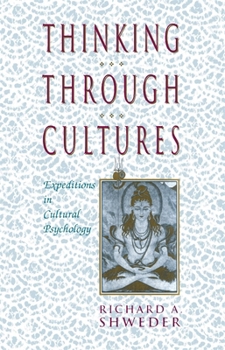Thinking Through Cultures: Expeditions in Cultural Psychology
Select Format
Select Condition 
Book Overview
A discipline is emerging called cultural psychology; it will serve as a force of renewal for both anthropology and psychology. In this book Richard Shweder presents its manifesto. Its central theme is that we have to understand the way persons, cultures, and natures make each other up. Its goal is to seek the mind indissociably embedded in the meanings and resonances that are both its product and its components.
Over the past thirty years the person as a category has disappeared from ethnography. Shweder aims to reverse this trend, focusing on the search for meaning and the creation of intentional worlds. He examines the prospect for a reconciliation of rationality and relativism and defines an intellectual agenda for cultural psychology. What Shweder calls for is an exploration of the human mind, and of one's own mind, by thinking through the ideas and practices of other peoples and their cultures. He examines evidence of cross-cultural similarities and differences in mind, self, emotion, and morality with special reference to the cultural psychology of a traditional Hindu temple town in India, where he has done considerable work in comparative anthropology. And he critiques the concept of the "person" implicit in Western social science, as well as psychiatric theories of the "subject." He maintains that it will come as no surprise to cultural psychology if it should turn out that there are different psychological generalizations or "nomological networks"--a Hindu psychology, a Protestant psychology--appropriate for the different semiotic regions of the world. Shweder brings the news that God is alive not dead, but that there are many gods.Format:Paperback
Language:English
ISBN:0674884167
ISBN13:9780674884168
Release Date:March 1991
Publisher:Harvard University Press
Length:420 Pages
Weight:1.51 lbs.
Dimensions:1.1" x 6.0" x 9.2"
Customer Reviews
1 rating
A CONFUSIONISTS VIEW OF PSYCHOLOGICAL-ANTHROPOLOGY
Published by Thriftbooks.com User , 25 years ago
This book was not written for you and me; we being non-anthropologists. It is more or less a text for use by graduate students and practitioners in the field of psychological anthropology. Having never taken a course in anthropology (although the subject holds my interest) and the probability being I never will, I thoroughly enjoyed this book and believe anyone eager to undertake a thorough scholarly exercise will enjoy it as well. The book is a wonderfully written exploration of a complicated subject matter from a different -- and often changing -- point of view, and it is the author's approach to his subject that is the lesson most valuable to all who read this book, regardless of the professional, vocational, or educational perspective of the reader.Richard A. Shweder, is a self-proclaimed confusionist, a term I suspect he invented but nevertheless explained at a recent symposium. A confusionist (not to be confused with Confuscianist), is someone who believes that the knowable world is incomplete if seen from any one point of view, incoherent if seen from all points of view at once, and empty if seen from the famous nowhere in particular. Given the choice between incompleteness, incoherence, and emptiness, Shweder opts for incompleteness while trying to get beyond such limitations by staying on the move between different ways of seeing and valuing things in the world. In addition to being a confusionist, he also admits to being neoantiquarian. A neoantiquarian, according to Shweder, is someone who rejects the idea that the world woke up, emerged from darkness, and became good for the first time yesterday, or three hundred years ago, in the West and Northern Europe. A neoantiquarian does not think that newness is necessarily a measure of progress.Bonus: Aficionados of fine writing will marvel at how craftily Professor Shweder pens a technical work. A most splendid example of how to approach technical writing assignments like a bard. If Shweder were to exercise poetic license you might suspect you were reading Vonnegut or Bellow.





